第66章 Purgatorio: Canto XVI(2)
The heavens your movements do initiate, I say not all; but granting that I say it, Light has been given you for good and evil, And free volition; which, if some fatigue In the first battles with the heavens it suffers, Afterwards conquers all, if well 'tis nurtured.
To greater force and to a better nature, Though free, ye subject are, and that creates The mind in you the heavens have not in charge.
Hence, if the present world doth go astray, In you the cause is, be it sought in you;
And I therein will now be thy true spy.
Forth from the hand of Him, who fondles it Before it is, like to a little girl Weeping and laughing in her childish sport, Issues the simple soul, that nothing knows, Save that, proceeding from a joyous Maker, Gladly it turns to that which gives it pleasure.
Of trivial good at first it tastes the savour;
Is cheated by it, and runs after it, If guide or rein turn not aside its love.
Hence it behoved laws for a rein to place, Behoved a king to have, who at the least Of the true city should discern the tower.
The laws exist, but who sets hand to them?
No one; because the shepherd who precedes Can ruminate, but cleaveth not the hoof;
Wherefore the people that perceives its guide Strike only at the good for which it hankers, Feeds upon that, and farther seeketh not.
Clearly canst thou perceive that evil guidance The cause is that has made the world depraved, And not that nature is corrupt in you.
Rome, that reformed the world, accustomed was Two suns to have, which one road and the other, Of God and of the world, made manifest.
One has the other quenched, and to the crosier The sword is joined, and ill beseemeth it That by main force one with the other go, Because, being joined, one feareth not the other;
If thou believe not, think upon the grain, For by its seed each herb is recognized.
In the land laved by Po and Adige, Valour and courtesy used to be found, Before that Frederick had his controversy;
Now in security can pass that way Whoever will abstain, through sense of shame, From speaking with the good, or drawing near them.
True, three old men are left, in whom upbraids The ancient age the new, and late they deem it That God restore them to the better life:
Currado da Palazzo, and good Gherardo, And Guido da Castel, who better named is, In fashion of the French, the simple Lombard:
Say thou henceforward that the Church of Rome, Confounding in itself two governments, Falls in the mire, and soils itself and burden."
"O Marco mine," I said, "thou reasonest well;
And now discern I why the sons of Levi Have been excluded from the heritage.
But what Gherardo is it, who, as sample Of a lost race, thou sayest has remained In reprobation of the barbarous age?"
"Either thy speech deceives me, or it tempts me,"
He answered me; "for speaking Tuscan to me, It seems of good Gherardo naught thou knowest.
By other surname do I know him not, Unless I take it from his daughter Gaia.
May God be with you, for I come no farther.
Behold the dawn, that through the smoke rays out, Already whitening; and I must depart--Yonder the Angel is--ere he appear."
Thus did he speak, and would no farther hear me.